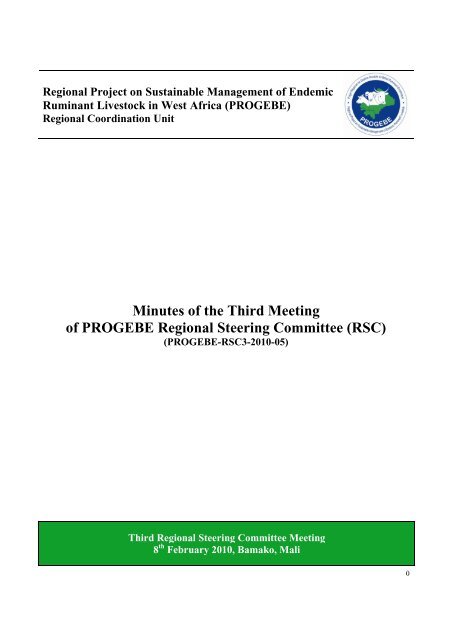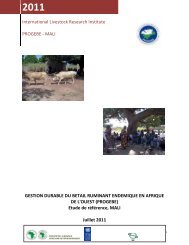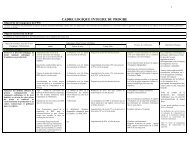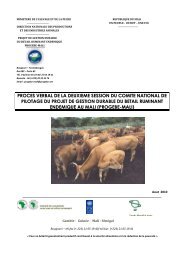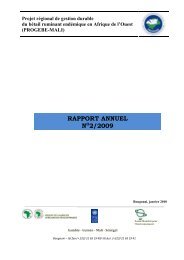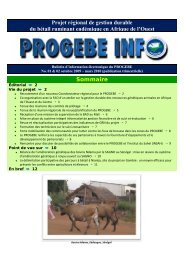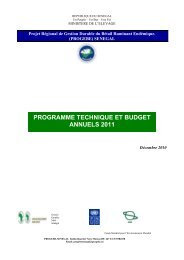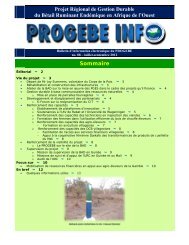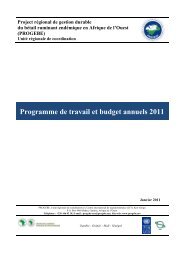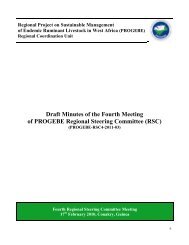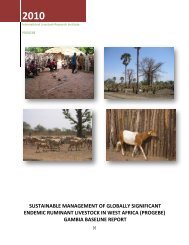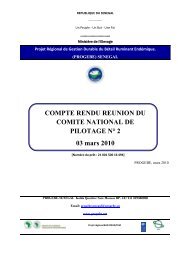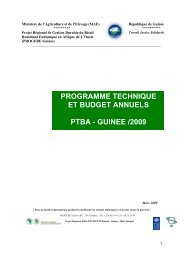Minutes-RSC-3-Feb 2010-Final-230210.pdf - PROGEBE
Minutes-RSC-3-Feb 2010-Final-230210.pdf - PROGEBE
Minutes-RSC-3-Feb 2010-Final-230210.pdf - PROGEBE
Create successful ePaper yourself
Turn your PDF publications into a flip-book with our unique Google optimized e-Paper software.
Regional Project on Sustainable Management of Endemic<br />
Ruminant Livestock in West Africa (<strong>PROGEBE</strong>)<br />
Regional Coordination Unit<br />
<strong>Minutes</strong> of the Third Meeting<br />
of <strong>PROGEBE</strong> Regional Steering Committee (<strong>RSC</strong>)<br />
(<strong>PROGEBE</strong>-<strong>RSC</strong>3-<strong>2010</strong>-05)<br />
Third Regional Steering Committee Meeting<br />
8 th <strong>Feb</strong>ruary <strong>2010</strong>, Bamako, Mali<br />
0
1) Introduction. The Third Meeting of the Regional Steering Committee (<strong>RSC</strong>) of the Regional<br />
Project on Sustainable Management of Endemic Ruminant Livestock in West Africa (<strong>PROGEBE</strong>)<br />
was held on 08 th <strong>Feb</strong>ruary <strong>2010</strong> in Azalaï Grand Hotel, Bamako, Mali. Fifteen days prior to the<br />
meeting, according to the terms of reference of the <strong>RSC</strong>, working documents such as the minutes<br />
of the second meeting of the <strong>RSC</strong>, a synthesis of activities implemented in 2009 and the <strong>2010</strong><br />
proposed annual work plan and budget were electronically transmitted to the <strong>RSC</strong> members. Later<br />
on, <strong>PROGEBE</strong> and ILRI 2009 annual reports, ILRI <strong>2010</strong> workplan and the report “UNDP EEG<br />
and GEF Annual Performance Report (APR) - Project Implementation Review (PIR) 2009 –<br />
Biodiversity” were sent or made available during the meeting.<br />
The meeting started at 09:10 am by an official opening ceremony chaired by Her Excellency, Mrs.<br />
Madeleine Ba Diallo, Minister of Livestock and Fisheries of the Republic of Mali in the presence<br />
of representatives of <strong>PROGEBE</strong> member countries, UNDP/GEF, UNOPS, ITC, ILRI, CORAF-<br />
WECARD, CIRDES, livestock professionals, Malian national project and service directors, and<br />
regional and national <strong>PROGEBE</strong> staff.<br />
The opening ceremony was introduced by the 2009 <strong>RSC</strong> chairman, Honorable Dr Amadou Sowe,<br />
Permanent Secretary I of the Ministry of Agriculture of the Republic of The Gambia. After<br />
thanking the Malian authorities for hosting the meeting and all the support they provided, Dr Sowe<br />
indicated the willingness of the national authorities to support the project to achieve its goal. He<br />
concluded by urging the staff involved in the implementation of the project to persevere in their<br />
project implementation efforts with discipline and spirit of confidence, bearing in mind the planned<br />
objectives.<br />
Her Excellency, The Minister of Livestock and Fisheries of the Republic of Mali, underlined the<br />
importance of the project for the development of livestock in the subregion and requested the<br />
project staff to spare no effort in pursuing the dynamics set in motion and speeding up the<br />
implementation of activities. She, thereafter, officially declared open the third session of the<br />
Regional Steering Committee.<br />
After, a round table was done to allow the participants to present themselves. With the exception of<br />
FAO, who earlier asked to be excused for not being able to attend the meeting, all <strong>RSC</strong> members<br />
were present. The list of the <strong>RSC</strong> members participating in the meeting is attached.<br />
<strong>Final</strong>ly, the Minister announced that Dr Mamadou Coulibaly, Technical Advisor and representative<br />
of the Ministry of Livestock and Fisheries of the Republic of Mali, was designated as new<br />
chairman of the <strong>RSC</strong> before closing the opening session.<br />
2) Agenda of the meeting. Following its review, the meeting adopted the proposed agenda as<br />
follows:<br />
Introduction by the 2009 <strong>RSC</strong> chairperson<br />
Official opening of the <strong>RSC</strong><br />
Presentation of the participants<br />
Designation or election of the new <strong>RSC</strong> chairperson<br />
Approbation of the agenda<br />
Review and adoption of the report of the second session of the <strong>RSC</strong><br />
Update on the project implementation progress in 2009<br />
Presentation of <strong>2010</strong> annual work plan and budget<br />
1
Planning of the next <strong>RSC</strong> meeting<br />
Any other business<br />
3) Review of the report of the second session of the <strong>RSC</strong>. The proposed draft report, made<br />
available at the end of January 2009 and distributed as part of the working documents of the third<br />
<strong>RSC</strong> session, was reviewed and validated by the members of the <strong>RSC</strong>. Concerning item 7 “Review<br />
of the TORs of the <strong>RSC</strong>” on voting rights of the <strong>RSC</strong> members, in particular UNDP/GEF,<br />
Clarifications were made indicating the restriction of voting rights to members representing the<br />
participating countries. The report was therefore adopted as reflecting accurately the content of the<br />
discussions of the second meeting of <strong>RSC</strong> held in January 2009.<br />
4) Update on the project implementation progress in 2009. The related documents as well as the<br />
presentation made by the <strong>PROGEBE</strong> Regional Monitoring and Evaluation Expert, showed that<br />
year 2009 was marked by:<br />
• the organization of the 5 inception workshops of the project,<br />
• the completion of office set up for 4 coordination units and the establishment of the 12 site<br />
coordinations,<br />
• the preparation of project basic documents such as manuals of procedures, monitoring and<br />
evaluation guide, and communication plan etc.,<br />
• the update of the surveys carried out by ILRI to update the baseline situation,<br />
• the participative elaboration of strategies for genetic improvement and natural resource<br />
management through consultations and 2 thematic visits and workshops,<br />
• the negotiation and signature of several protocols with technical partners,<br />
• the bidding process for feasibility studies and control of civil engineering infrastructures for<br />
research centers and livestock marketing,<br />
• the initiation of field activities (identification of multiplier herds, consultations with<br />
breeders, nucleus foundation rehabilitation, revitalization of existing breeding programs,<br />
identification of needs of rehabilitation of research centers and marketing infrastructures,<br />
bush fires control, mapping, NRM indicator update, capacity building activities etc.,<br />
• strengthening International Trypanotolerance Centre (ITC) through the recruitment of a<br />
Regional Expert in Capacity Strengthening and Institutional Building, the allocation of<br />
equipment and support for R/D proposal writing.<br />
In addition, the project monitoring and evaluation system is effective with the regular production of<br />
periodical activity reports, the participatory assessment and planning of activities, the beginning of<br />
the zoosanitary monitoring system and the computerized integrated management system (M & E<br />
and accounting), the review of NRM indicators, the pre-audit and supervision missions, as well as<br />
the meetings of supervision bodies. Various contacts were also established to develop synergy of<br />
actions with other institutions and actors involved in the development of livestock in the subregion.<br />
The two separate logical frameworks (AfDB and GEF) were consolidated into one.<br />
On the budgetary side, 63% of the 2009 budget (disbursements and commitments) has been<br />
executed with respectively 55%, 83% and 66% for AfDB, GEF and States funds. Yet, the financial<br />
execution rate (disbursements) is 45% with respectively 27%, 83% and 66% for AfDB, GEF and<br />
States funds. At the end of 2009, 16% of the overall project budget (AfDB, GEF and States funds)<br />
was executed. Strategic Lines of intervention 4 and 6 constitute respectively 38 and 40% of<br />
expenses.<br />
2
The major difficulties encountered during the implementation of 2009 AWPB are related to delays<br />
due to the slow procurement processes, the recruitment of site staff, and the limited disbursements<br />
of funds for some countries.<br />
Issues raised during the discussion following the presentation include:<br />
• the congratulations to the project team for the quality and timeliness of the working<br />
documents,<br />
• the satisfactory level of the project implementation taking into account delays required by<br />
acquisition processes,<br />
• the relevance of lessons drawn on the necessity of realism for budget preparation,<br />
• the delays in the implementation of certain activities (baseline, infrastructure rehabilitation<br />
etc.),<br />
• the role of the project in the facilitation of the access to the financial services and the need<br />
for clarifying it to communities to avoid over expectations which could lead to<br />
misunderstanding,<br />
• the incidence in terms of time and financial costs of subcontracting part of the activities<br />
under the responsibility of ILRI within the MoA between ILRI/UNOPS/UNDP,<br />
• the improvement of the dissemination of the project electronic newsletter by sending hard<br />
copies to those with no Internet access,<br />
• the need for a more realistic planning and budgeting process within the framework of the<br />
project implementation,<br />
• the qualifying training in genetics of 8 national experts planned by the project,<br />
• the implementation of the R/D activities of the project, associating CORAF-WECARD to<br />
avoid redundancy and encourage synergies at regional level,<br />
• the development of a technical proposal to implement the mandate of CIRDES within the<br />
project following consultative meetings and transmission of ToRs,<br />
• the implementation of the genetic improvement program in particular regarding the<br />
localization of the nucleus foundations and the integration of small ruminants,<br />
• the organization of a study on genetic and commercial information dissemination,<br />
• the correction of the number of vehicles acquired by <strong>PROGEBE</strong> Guinea which is 4 instead<br />
of 3,<br />
• the opportunity of developing a protocol with the Veterinary Services of Guinea,<br />
• the impact of the vacancy of the position of GEF Regional Coordinator on the project<br />
implementation and the imminence of the arrival of the Regional Coordinator newly<br />
recruited,<br />
• the importance of bush fire control activities, in particular, for sustainable management of<br />
ecosystems biodiversity,<br />
• the low execution rate of Mali 2009 budget and the need for action to improve it,<br />
• the need for holding the 4 national Steering Committees meetings before the venue of the<br />
Regional Steering Committee meeting,<br />
• the need for intensifying field activities for an effective impact of the project on community<br />
livelihood,<br />
• The deficit of communication between the project and UNDP-Mali Lead Bureau.<br />
3
Recommendations. Following clarifications provided by members of <strong>PROGEBE</strong> Coordination<br />
staff and Dr. Abdou Fall in response to issues raised the <strong>RSC</strong> meeting:<br />
• recommended to ensure that:<br />
o the organization of National steering committees meetings in the different countries<br />
are organized before the project Regional steering Committee meeting,<br />
o the project will have a real impact on the livelihood of populations,<br />
• adopted the 2009 activity report.<br />
5) <strong>2010</strong> Annual Work Plan and Budget (AWPB). It was introduced by a presentation of the AfDB<br />
Regional coordinator. Activities and budget planned in <strong>2010</strong>, the project third implementation year,<br />
were identified following a participatory and bottom-up approach described in a methodological<br />
note prepared by the Regional Coordination Unit (RCU) and shared in August 2009. The two<br />
evaluation reports 1 , review of the first two years of the project implementation, national AWPBs as<br />
well as contributions received from technical partners were taken into account to develop it. Once<br />
drafted, it was reviewed by the RCU team. It was then shared with the national coordination units<br />
and technical partners during the annual operational planning workshop of the project in December<br />
2009 before being submitted for approval to the Regional Steering Committee, AfDB and UNDP-<br />
GEF.<br />
Following an outline of the overall objectives of the project, the AWPB organizes, for each of the<br />
six (6) 2 strategic intervention lines of the project, indicates planned activities. In accordance with<br />
the systemic approach followed in designing the project, activities focus on animals and various<br />
professionals working around the animal and its physical, socio-economic and institutional<br />
environment. Activities planned include:<br />
• finalization of baseline studies,<br />
• start of the rehabilitation/construction of 5 research centers, 19 livestock markets, 17<br />
slaughtering areas and 11 milk processing units, the rehabilitation of 160 km of access<br />
roads,<br />
• strengthening of community based approaches of NRM through local conventions<br />
promotion, the control of bush fire, soil restoration,<br />
• genetic improvement through the establishment or reconstitution of 5 foundation nuclei, the<br />
completion of the identification of 120 multiplication herds,<br />
• boosting/emergence and institutional development of community based organizations in the<br />
genetic improvement and NRM programs,<br />
• capacity strengthening activities for agro-pastoralists and technicians (training of 8 national<br />
experts in genetics, training on livestock techniques, reproduction and genetics of 20<br />
livestock technicians, 30 agro-pastoralists and 30 community relays, training in NRM<br />
techniques of 20 technicians and 30 relays on environment and 2 500 agro-breeders on<br />
above-mentioned and NRM techniques,<br />
• training of 54 site technicians in conflict management and mapping,<br />
• a complementary study on endemic ruminant marketing,<br />
• elaboration of a strategy of small ruminant genetic improvement,<br />
• development of partnerships with technical institutions, communities and livestock<br />
breeders.<br />
1 AfDB Evaluation Report and GEF Prodoc<br />
2 Following various consultations, it was decided to organize the various activities around 6 intervention lines. This is to<br />
facilitate communication and operational planning.<br />
4
• organization of a regional workshop of animal genetic resource management and<br />
consultation on transhumance.<br />
<strong>2010</strong> Budget is about US$ 8,084,262 against 8,731,372 in 2009, a reduction of US$ 647,372 and<br />
7% in absolute and relative values. 59, 29 and 10% of the resources come respectively from AfDB,<br />
GEF and Governments. The remaining 2% of the resources represent in-kind contributions of ILRI<br />
and ITC and funds allocated by FAO for the venue of a regional workshop on Animal Genetic<br />
Resource Management. The Strategic Lines of intervention 1, 2 and 3 will get respectively 21%,<br />
17% and 19% of the funds for mainly works, studies and training. The management costs amount<br />
to 37 % of the <strong>2010</strong> budget. 74% of AfDB budget will be specially mobilized for works, goods and<br />
services, while the proportion assigned to staff and operation costs is estimated at 26%. In <strong>2010</strong>,<br />
49% of the GEF budget will be specially mobilized for the implementation of outcome 1<br />
(Production and productivity) while the parts assigned to outcome 3 (Sustainable management of<br />
natural resources) and 5 (Cooperation, information exchange and coordination) are estimated at 17<br />
and 21%. 72% of the States budget will be specially mobilized for staff, operation and services,<br />
while the proportion assigned to work is estimated at 22%.<br />
During the discussion, issues raised covered:<br />
• The link between activities implemented in 2009 and those planned in <strong>2010</strong> to build up on<br />
assets and lessons learnt,<br />
• The carrying forward of budget balance from one year to another,<br />
• The possibility of using IFAD experience in micro-finance in The Gambia,<br />
• The dispatching per country of planned achievements regarding infrastructures,<br />
• The possibility of a partnership at the national level between The Gambia National Cattle<br />
Marketing Agency and <strong>PROGEBE</strong>-Gambia,<br />
• The use of result based planning approach when elaborating the working documents,<br />
• The analysis of the high rate of budget implementation (83%) of the GEF budget,<br />
• The review of the <strong>2010</strong> forecasts, in particular, for the water points and the access roads,<br />
• the State contributions concerning research centers which is effective through the allocation<br />
of operational budgets,<br />
• the implication in the organization of the workshop on transhumance of UEMOA and<br />
ECOWAS and also the taking into account of initiatives undertaken by other stakeholders,<br />
• the development by CIRDES of an appropriate technical proposal taking of account of the<br />
need of the project before the signature of a partnership protocol,<br />
• the need of an imbedded evaluation mechanism for all partnership protocols,<br />
• the importance of ILRI share in the GEF budget,<br />
• NRM activities (bush fire control, transhumance management, pastures management etc.)<br />
implemented by the project.<br />
Recommendations. Following clarifications provided by the project team, the third session of the<br />
<strong>RSC</strong>:<br />
• recommended pro-activeness when implementing acquisition processes to minimize the<br />
impact of long delays required by procedures,<br />
• adopted the <strong>2010</strong> Annual Work Plan and Budget while accepting the possibility of<br />
readjustments that may be proposed by the newly appointed GEF Regional Coordinator<br />
provided that these will not call into question the AWPB approved by the Regional Steering<br />
5
Committee, in its capacity of the regional authority in charge of validating the project<br />
annual work plan and budget.<br />
6) Venue of the fourth session of the <strong>RSC</strong><br />
In accordance with the conclusions of the <strong>RSC</strong> second session and following insurances given by<br />
the Guinean delegation, the meeting decided to hold its next <strong>RSC</strong> meeting in 2011 in Guinea.<br />
7) Any other business<br />
7.1. Field visit. Based on background information (logistics, security, program implementation<br />
level etc.) provided be the National Coordinator of <strong>PROGEBE</strong>-Mali, the <strong>RSC</strong> decided to postpone<br />
the field visit to next year. It strongly insisted on the need for ensuring the effective organization<br />
of this visit next year.<br />
7.2. Project evaluation. The meeting was informed of the intention of the GEF to organize an<br />
evaluation of the project in <strong>2010</strong> and of its wish of synergy with the mid-term evaluation<br />
envisaged within the framework of AfDB component in 2011. The <strong>RSC</strong> expressed its wish of<br />
synergy between the 2 evaluations which could then be carried out in 2011.<br />
8) Closing of the meeting. The Regional Steering Committee was closed at 14:50.<br />
Bamako, 22 nd <strong>Feb</strong>ruary <strong>2010</strong>.<br />
6
PAYS<br />
Annex. List of participants<br />
Name Function/Address Email/Telephone<br />
The Gambia<br />
1 Dr. Amadou Sowe Permanent Secretary 1, Ministry of Agriculture, The<br />
Quadrangle, Banjul, The Gambia,<br />
2 M. Lamin Camara Principal Economist, Central Projects/Programs and<br />
Aid Coordination Directorate, Gambia, Ministry of<br />
Finance And Economic Affairs, The Quadrangle,<br />
Banjul, The Gambia<br />
Guinea<br />
3 Dr. Sény Mané Représentant du Ministère de l’Élevage<br />
B.P 559, Conakry, Guinée<br />
4 Mr. Abdoulaye Diallo Chef de division, Études-Évaluation des projets<br />
d’investissement public, Direction nationale des<br />
investissements publics, Ministère de l’Économie et des<br />
Finances, B.P 2766, Conakry<br />
Mali<br />
5 Dr Mamadou Coulibaly Conseiller technique, Représentant du Ministère de<br />
l'Élevage et de la Pêche,<br />
6 M. Abdoulaye Daou Chargé de dossiers, DGDP, Ministère de l’Économie<br />
et des Finances, Bamako, Mali<br />
Senegal<br />
7 Dr Abdoulaye Dieng Conseiller, Ministère de l’Élevage, Sénégal, 00 221 33<br />
859 06 30<br />
8 Mrs. Magatte Ndiaye Diop Chargée des projets Développement Rural et<br />
Environnement, Direction de la Coopération<br />
Économique et Financière, Ministère de l'Économie et<br />
des Finances, 3ème étage, 8 rue de Ouillet, Immeuble<br />
MEF, Rue 211, Dakar, Sénégal<br />
INSTITUTIONS<br />
CIRDES<br />
9 Prof Abdoulaye Gouro Directeur général, CIRDES, 01 B.P 454 Bobo-<br />
Dioulasso 01, Burkina Faso<br />
amadousowe2003@yahoo.co.uk<br />
+220 422 61 34<br />
+220 997 30 41<br />
dambelkoto1@gmail.com<br />
+220 779 93 46<br />
fsaryk@yahoo.fr<br />
boubacarbalaise@yahoo.fr<br />
+224 60 59 85 76<br />
+224 66 86 56 45<br />
abdpilimini@yahoo.fr<br />
+224 60 25 13 25<br />
coulibalymd@yahoo.fr+223 66 78 48<br />
45<br />
abdou_daou@yahoo.fr<br />
+223 66696293<br />
ablaye_dieng@hotmail.com<br />
diengab@refer.sn<br />
+221 33 859 06 30<br />
maguetten@yahoo.fr<br />
+221 553 04 65<br />
agouro@fasonet.bf<br />
+226 20 97 20 53<br />
+226 20 97 22 87<br />
10 Dr Mamadou Sangaré CIRDES, 01 B.P 454 Bobo-Dioulasso01, Burkina Faso mamadousangare@hotmail.com<br />
+226 20 97 20 53<br />
+226 76 82 86 09<br />
CORAF-WECARD<br />
11 Dr Hamadé Kagoné Gestionnaire de Programme, Élevage, Pêche et<br />
Aquaculture, CORAF/WECARD, 7, av. Bourguiba<br />
B.P. 48, CP 18523 Dakar-RP, Sénégal<br />
ILRI<br />
12 Dr. Steve Stall Director of Biotechnology, ILRI, Box 30709 Nairobi<br />
00100, Kenya<br />
hamade.kagone@coraf.org<br />
+221 33 869 96 18<br />
+221 33 869 96 29 (ligne directe)<br />
+221 77 586 25 69 (Mobile)<br />
s.stall@cgiar.org<br />
+ 254 20422 3000<br />
13 Dr Abdou Fall Project Coordinator, ILRI, B.P 320 Bamako, Mali a.fall@cgiar.org<br />
+223 20 22 33 75<br />
+223 78 54 63 44<br />
ITC<br />
14 M. Lamin Drammeh Representing Dr Babou Jobe, ITC Acting Director<br />
General<br />
babjobe@yahoo.com<br />
+220 448 4925
UNDP/GEF<br />
15 Mme. Aida M'Bo Keita Conseiller au Programme/Environnement, PNUD,<br />
Immeuble Bambi, Bamako, Mali<br />
16 Ms. Fabiana Issler Regional Technical Advisor for Biodiversity<br />
UNDP Environment and Energy Group (EEG)<br />
GEF Regional Coordination Unit<br />
351 Schoeman Str. - P O Box 13196, The Tramshed,<br />
Pretoria - 0126, South Africa<br />
aida.mbo-keita@undp.org<br />
+223 76 45 59 95<br />
+223 20 70 00 13<br />
fabiana.issler@undp.org<br />
Landline: +27 12 354 8128<br />
Mobile: + 27 82 300 4665<br />
UNOPS<br />
17 M. Donato Serena Portfolio Manager, UNOPS, Dakar, Sénégal donatoS@unops.org<br />
+221 778 08 87 44<br />
18 M. Jogchum Meidert<br />
Finnema<br />
<strong>PROGEBE</strong><br />
19 Dr. Mouhamadou Moustapha<br />
Diaw<br />
Special Assistant Social Development social, UNOPS,<br />
Johannesburg, South Africa<br />
Regional Coordinator - AfDB, <strong>PROGEBE</strong>-RCU, PO<br />
Box 4060 Bakau, The Gambia<br />
20 Mr. Abdelkader Bensada Regional Coordinator – GEF, <strong>PROGEBE</strong>-RCU, PO<br />
Box 4060 Bakau, The Gambia<br />
21 Mrs. Ndeye Djigal Sall Regional Expert in Monitoring and Evaluation,<br />
<strong>PROGEBE</strong>-RCU, PO Box 4060 Bakau, The Gambia<br />
22 Mr. Papa Mambaye Sow Head of Finance and Administration, <strong>PROGEBE</strong>-RCU,<br />
PO Box 4060 Bakau, The Gambia<br />
23 Mr Alassane Diallo Regional Expert in Information and Communication,<br />
<strong>PROGEBE</strong>-RCU, PO Box 4060 Bakau, The Gambia<br />
24 Dr Boubacar Diallo Coordonnateur national, <strong>PROGEBE</strong>-Guinée<br />
BP-559 Conakry, Guinée<br />
25 Dr Famara Sanyang National Coordinator, <strong>PROGEBE</strong>-Gambia, PO box<br />
4060 Bakau, The Gambia<br />
26 Dr Mamadou Diop Coordonnateur national, <strong>PROGEBE</strong>-Sénégal<br />
BP 447 Kolda, Sénégal<br />
27 Dr Ousmane Traoré Coordonnateur national, <strong>PROGEBE</strong>-Mali, Bougouni,<br />
Mali<br />
28 Abdel Kader Haïdara Expert suivi évaluation, <strong>PROGEBE</strong>-Mali, Bougouni,<br />
Mali<br />
29 Mr..Djibril Traoré Expert national en gestion des ressources naturelles<br />
(GRN), <strong>PROGEBE</strong>-Mali, Bougouni, Mali<br />
30 Mr. Sidibe Morodian Responsable administratif et financier, <strong>PROGEBE</strong>-<br />
Mali, Bougouni, Mali<br />
31 Mr. Ibrahima Traoré Expert national en production et industries animales,<br />
<strong>PROGEBE</strong>-Mali, Bougouni, Mali<br />
32 Mrs. Karidjatou Camara Secrétaire de direction, <strong>PROGEBE</strong>-Mali, Antenne de<br />
Bamako, Mali<br />
33 Mrs. Diahara Diakité Touré Assistante-comptable, <strong>PROGEBE</strong>-Mali, Antenne de<br />
Bamako, Mali<br />
JogchumF@unops.org<br />
+27 - 82451555<br />
moustapha.diaw@progebe.net<br />
moustaphadiaw@gmail.com<br />
+220 996 56 79<br />
abdelkaderbensada@yahoo.com<br />
Ndeye.djigal@progebe.net<br />
ndeyedjigal@gmail.com<br />
+220 996 21 07<br />
papa.sow@@progebe.net<br />
Papa.sky@sky.com<br />
+220 996 73 33<br />
alassane.diallo@progebe.net<br />
alassanedial@gmail.com<br />
+220 996 51 87<br />
boubacarbalaise@yahoo.fr<br />
+224 60 29 43 28<br />
famara.sanyang@progebe.gm ;<br />
fbsanyang@yahoo.com<br />
+220 9963810<br />
+220 7773810<br />
mamadou.diop@progebe.sn<br />
mamadiop@refer.sn<br />
221 77 636 20 11<br />
drpanitraore@yahoo.fr<br />
Tel: (223) 76 33 99 24<br />
kader.haidara@progebe.net.ml<br />
kdr_haidara@yahoo.fr<br />
+223 76 44 74 88<br />
djibril.traore@progebe.net.ml<br />
traore.djibril@yahoo.fr<br />
+223 76 48 62 05<br />
+223 66 58 22 34<br />
+223 20 22 20 22 / 20 23 12 27<br />
morodian.sidibe@progebe.net.ml<br />
sidibemorodian@yahoo.fr<br />
+223 76 19 33 30<br />
ibrahima.traore@progebe.net.ml<br />
ibrahima_sir@yahoo.fr<br />
+223) 76 37 93 71<br />
madjan2007@yahoo.fr<br />
+223 79 15 04 25<br />
diaharadiakiteob@yahoo.fr
Regional Project on Sustainable Management<br />
of Endemic Ruminant Livestock in West Africa (<strong>PROGEBE</strong>)<br />
For a productive trypanotolerant livestock<br />
contributing to food security and poverty alleviation<br />
<strong>PROGEBE</strong> Regional Coordination Unit s/c International Trypanotolerance Center (ITC), Kerr Serign<br />
P.O. Box 4060 Bakau, The Gambia, West Africa<br />
Phone: +220 446 02 18, Fax: +220 446 04 32, E-mail: progebe-rcu@progebe.net; Website: www.progebe.net<br />
The Gambia – Guinea – Mali- Senegal


